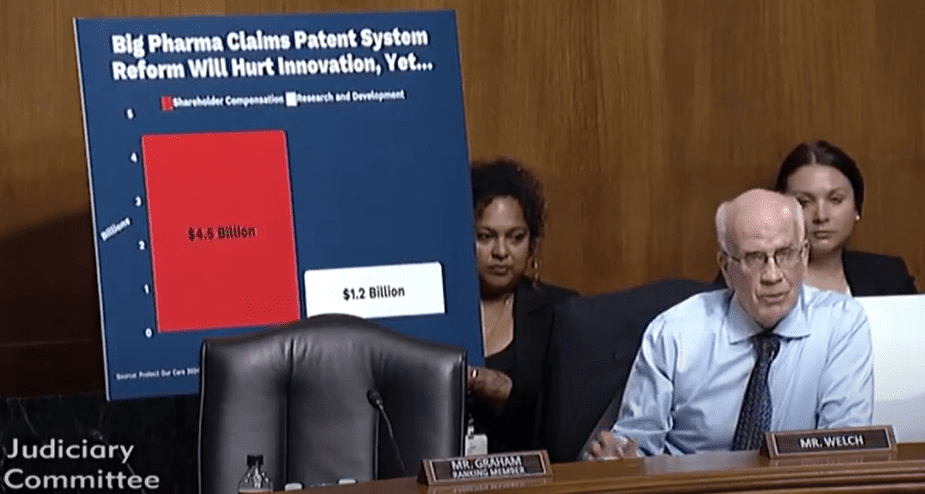WASHINGTON, D.C. – The Senate Judiciary Committee today held a hearing requested and chaired in part by U.S. Senator Peter Welch (D-Vt.) on the need to address rising prescription drug prices and help ensure medications are accessible and affordable for hardworking families.
In his opening remarks, Judiciary Chairman Dick Durbin (D-Ill.) acknowledged Sen. Welch’s longtime efforts to lower drug prices, thanking him for his, “interest in this hearing and this issue,” and stated, “When he first came to the committee, we sat down and talked about his subcommittee assignments, and he told me that this is one issue he wanted to focus on…Thank you for being here, Senator.” Sen. Durbin also acknowledged Sen. Welch’s leadership on this issue in remarks on the Senate floor yesterday.
In his questioning, Senator Welch urged to advance his bipartisan, bicameral bill to address patent thicketing, a practice the pharmaceutical industry uses to prevent generic competition, which dramatically increases health care costs for patients in Vermont and across the country.
“The bottom line here is the cost of healthcare in this country is killing folks. It is such a brutal, punitive burden on everyone. And that’s for citizens in all of our states. Folks who are having trouble paying their rent, or they’re having trouble paying for groceries…they can’t even dream about owning a house,” said Senator Welch. “And the biggest driver in healthcare costs…are prescription drugs. And whether you want to call it abuse, or gaming, the fact is people can’t afford it and it is not sustainable.”
In his questioning of Dr. William Feldman, Associate Physician, Division of Pulmonary and Critical Care Medicine at Brigham and Women’s Hospital, Sen. Welch focused on the patent thickets drug companies are creating for new blockbuster weight loss drugs.
“Let’s talk about Ozempic…It costs $936 a month in U.S. Only $147 in Canada, and $83 in France. That’s a huge expense for our employers and for our taxpayers. And last year, Novo Nordisk made $13.9 billion in sales from Ozempic—60% coming from the U.S. So, we’re just paying an enormous amount. But on the patents…there’s 25 patents and only four for active ingredient. Can you just explain what that means?” asked Senator Welch.
Dr. Feldman responded: “That’s exactly right…I think it’s a perfect illustration of the problem. You have 25 patents; 21 on these delivery devices. The FTC has said ‘these patents should never have been listed in the orange book in the first place,’ and the brand-name firms already are suing for infringement. They’re litigating these brands.”
“I have a bill that I introduced with Senator Klobuchar and Senator Braun to streamline the drug patent litigation by limiting the number of terminally disclaimed patents a drug company can assert [in litigation],” continued Senator Welch. “Can you comment on your view on that legislation and how it would be helpful or not?”
Dr. Feldman testified, “Yes, I think it’s a great piece of legislation.” He continued, “The idea is that currently, the patent office is required to reject patents that are obvious follow-ons from other patents…And I think by limiting the litigation on these patents to one per family, I think it could promote timely competition.”
Watch the Senator’s full remarks below:

Senator Welch has long supported initiatives to lower prescription drug prices for Vermonters. This year, Senator Welch along with colleagues Sens. Mike Braun (R-Ind.) and Amy Klobuchar (D-Minn.) introduced new bipartisan, bicameral legislation to streamline prescription drug patent litigation, encourage fair market competition, and lower prescription drug prices.
In February, Welch hosted a Capitol Hill briefing with health care experts and patient advocates focusing on the harmful impacts of patent thickets on everyday patients, and last week hosted a roundtable in Burlington to discuss making health care more affordable for Vermonters and people across the country.
This Congress, Senator Welch and Senator Klobuchar also introduced the Strengthening Medicare and Reducing Taxpayer (SMART) Prices Act to build on the success of the Inflation Reduction Act to increase the number of drugs eligible for negotiation and unlock the ability of the U.S. Government to negotiate lower drug prices for Medicare Part D beneficiaries.
Provisions from Sen. Welch’s bill introduced with Sen. Klobuchar (D-Minn.) to end the ban on Medicare negotiating lower prescription drug prices for Medicare’s 50 million seniors, introduced during his tenure in the U.S. House of Representatives, were incorporated into the Inflation Reduction Act.
###
